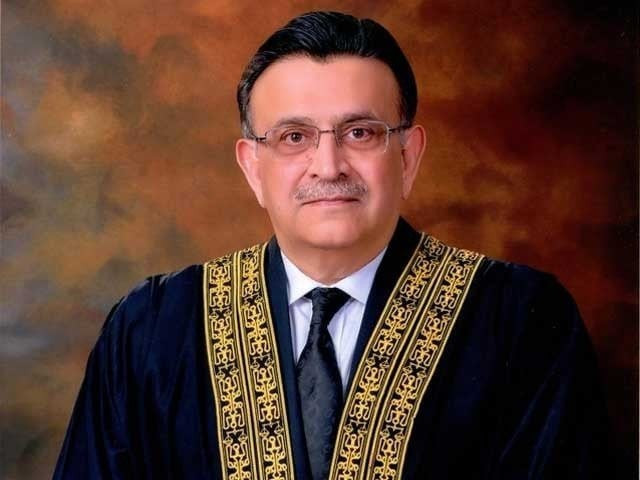PDM govt breezes past 'judicial overreach'
Unlike his predecessors, Bandial refrained from giving govt tough time

Despite of the severe clash between the executive/parliament and superior judiciary on the holding of general elections of two provincial assemblies, Chief Justice of Pakistan Umar Ata Bandial opted for judicial restraint and did not interfere in matters related to bad governance, maladministration, alleged illegal appointments, etc during the PDM-led government's tenure.
Two former chief justices, Iftikhar Muhammad Chaudhry and Mian Saqib Nisar, had consistently exercised suo motu jurisdiction and intervened in matters pertaining to governance. Both the PML-N and PPP were the victim of their 'judicial overreach', which ultimately became the cause of tensions between them and the judiciary.
However, CJP Bandial’s case is different as he never gave a tough time to the coalition government on governance issues. Notably, he even went far enough to facilitate the government by endorsing the out-of-court settlement on the Reko Diq project.
A three-judge special bench led by CJP Bandial did not suspend the legislation regarding the National Accountability Ordinance (NAO) 2000 which gave benefit to several PDM leaders who were facing charges and investigations in NAB cases.
Although soon after the PDM government took office, the CJP had taken suo motu notice over the alleged interference of the government in the affairs of investigation and prosecution in pending graft cases against top government functionaries, the matter was soon adjourned indefinitely after the fourth hearing on May 19. Shortly after, Prime Minister Shehbaz Sharif and his sons were acquitted in graft cases.
CJP Bandial had also played a key role in the completion of the process of the no-confidence against ex-prime minister Imran Khan. A special bench led by CJP Bandial had taken up the Supreme Court Bar Association's (SCBA) petition seeking direction to all state functionaries to act strictly in accordance with the Constitution and the law in light of the no-trust vote against Imran.
The same bench had set aside National Assembly Deputy Speaker Qasim Suri’s ruling to dismiss the no-trust resolution and the subsequent dissolution of the lower house of parliament by President Arif Alvi on the premier’s advice.
The apex court had come under fire, even at the hands of PTI supporters, for having opened the courts at night for the completion of the process of Article 95 of the Constitution.
Read SCBA to fight election delay tied to census
The judgment that impacted the CJP's relationship with the PDM government most was probably the ruling on a presidential reference declaring the votes of defecting lawmakers would not be counted under Article 63A.
This ruling has been regarded as the worst in recent history, inviting criticisms terming the judgment as an attempt to rewrite the Constitution. Some lawyers believe that the judgment was in fact the CJP's 'balancing act' that ultimately paved the path for the PML-N government in Punjab to be toppled.
CJ Bandial had ensured the chief minister's elections were held only after the bye-elections at the Punjab Assembly.
All ruling parties had expressed mistrust over the CJP and his 'like-minded judges', giving rise to requests for the formation of a full-court to hear petitions against then deputy speaker Punjab Assembly Dost Mazari's ruling which had discarded the votes of ten PMLQ lawmakers. The same bench had set aside Mazari's ruling and declared Chaudhry Pervez Elahi as the new Punjab chief minister. This judgment became the main bone of contention between the executive and the CJ's court.
In response to that judgement, the federal government's representatives (law minister and attorney general of Pakistan) did not endorse CJP's nominations for appointment as SC judges in the meeting of the Judicial Commission of Pakistan (JCP) in July last year.
Even CJP Bandial was visibly upset by this government's reaction. He had expressed his view in a speech given at the start of the new judicial year.
Subsequently, both government representatives had endorsed the CJP's nominees for SC judges.
Later one of the representatives had revealed that they had supported CJP's nominations on the advice of then-army chief General Qamar Javed Bajwa.
When Imran Khan was insistent that senior military officers be nominated in the FIR over the Wazirabad incident, the SC led by CJ Bandial had ordered the Punjab police to comply with the demand in accordance with the law and the next day the case was registered accordingly.
The PDM government remained upset with the CJP for not initiating contempt proceedings against Imran Khan after the PTI held a rally apparently in violation of the apex court's May 25 orders.
Tensions between the executive-legislative branch and the judiciary came to a boiling point when a CJ Bandial-led bench took notice of the delay in the provision of provincial elections in Punjab and Khyber Pakhtunkhwa.
The powerful circles were also unhappy with CJP Bandial over the SC's decision to invoke original jurisdiction in the matter.
Meanwhile, a debate was triggered in parliament over the actions of the CJ and his 'like-minded judges'. In this context, the judicial order to hold elections at the Punjab Assembly on May 14 was violated, but judges showed restraint and did not initiate contempt proceeding against the government functionaries.
PDM parties also organised a protest in front of SC. Adding to the controversy where a series of audio leaks related to SC judges.
CJP Bandial however showed patience over the criticism pointed at him and his fellow judges.
The fissures in the judiciary exposed it to machinations of the government and the establishment which used these divisions to their maximum advantage.
Although the PDM government's tenure is coming to an end, CJ Bandial still has a little over a month remaining until he is to leave office. It remains to be seen whether he will pass some coercive orders in pending matters or not.



















COMMENTS
Comments are moderated and generally will be posted if they are on-topic and not abusive.
For more information, please see our Comments FAQ